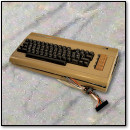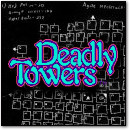Archive for the 'Gaming History' Category
[ Retro Scan of the Week ] Splatterhouse 3
Monday, October 26th, 2009 “The kind of game rating systems were invented for.”
“The kind of game rating systems were invented for.”
Splatterhouse 3 is by far my favorite entry in the Splatterhouse series. The other two just don’t cut it for some reason. I prefer Splatterhouse 3’s room-based approach to the game, and its controls are pretty good. It incorporates an on-screen map too, which makes it feel more like an adventure game.
Happy Halloween, by the way!
Discussion Topic of the Week: What’s the goriest video game you’ve ever played?
VC&G’s Halloween Video Game Costume Ideas (2009)
Monday, October 19th, 2009 Yep, it’s that time of year again: time for VC&G‘s famous Video Game Halloween Costume Ideas — 2009 edition.
Yep, it’s that time of year again: time for VC&G‘s famous Video Game Halloween Costume Ideas — 2009 edition.
This article series is almost an institution now, as we enter our fourth year of providing last-minute costume suggestions to desperate video game nerds everywhere. Each of these costumes is guaranteed to get you candy, or your money back. After you’re done reading, feel free to post your own costume suggestions in the comments below.
[ Continue reading VC&G’s Halloween Video Game Costume Ideas (2009) » ]
The Weirdest Video Game Box Art of All Time
Friday, October 16th, 2009And you thought eatin’ shrooms to grow bigger was strange. How about this: flying green crabs dropping red clay bricks on a grinning, toothy duck wearing a cape and glasses with a double-barrel shotgun coming out of his mouth.
At least it’s set in a pond, so the backdrop isn’t too fanciful.
The game is Deadly Duck for the Atari 2600, a 1982 shooter title published by 20th Century Fox. I’ve played it, and it’s not too bad. It’s a vertical shooter, similar to Space Invaders and Demon Attack.
 You play as a duck striving to gun down flying crabs that drop bricks on you — actually, around you. When the bricks land, they temporarily impede your movement to the left or right, then disappear in a few seconds.
You play as a duck striving to gun down flying crabs that drop bricks on you — actually, around you. When the bricks land, they temporarily impede your movement to the left or right, then disappear in a few seconds.
This is one of the many vintage video game box illustrations that rendered the typically absurd and abstract situations of extremely low resolution games in a very realistic and literal manner. Super Breakout for the 2600 is one of my favorites (it also inspired a 2006 Halloween costume suggestion).
You can find many more examples of this curious art form on the web, including many parody boxes, so watch out for fakes.
[ Retro Scan of the Week ] Nintendo 64 Launch
Monday, September 28th, 2009 Only if you want the best!! !! — !!
Only if you want the best!! !! — !!
Thirteen years ago this Tuesday, Nintendo launched the Nintendo 64 video game console in North America. That’s right: it was on the 29th, despite the “September 30th” that this ad boldly proclaims. After this ad was published, Nintendo moved the launch date a day back from a Monday to a Sunday (supposedly to prevent people from skipping work or school to buy the system, although I haven’t confirmed that).
It seems more likely to me that Nintendo realized a larger number of people would actually be able queue up for a system (or simply just go to the store and buy it) on their day off. Stronger opening day sales numbers were (and still are) important to console makers because they meant not only more press coverage, but also more license for ecstatic gloating and self-aggrandizement from the company’s PR department. If you hadn’t noticed already, hyperbolic show and bluster were dominating themes in 1990s American video game marketing.
Either way, dinosaurs did fly, and an enormous Stay-Puft Mario carelessly wiped western Europe off the map with his spinning boot heel. Fun was had by all.
Discussion topic of the week: What’s your favorite Nintendo 64 game of all time?
[ Retro Scan of the Week ] The Thrill of Capcom
Monday, September 14th, 2009[ Retro Scan of the Week ] Super Mario World 2
Monday, August 31st, 2009 “He goes all over the place (and we don’t mean Number Two.)”
“He goes all over the place (and we don’t mean Number Two.)”
Here’s a classic advertisement for Super Mario World 2 from the “Play it Loud” era. Baby Mario looks quite destructive.
In the mid-1990s, Nintendo tried to downplay its kiddie image and appeal to the “I’m-awesome-because-I-huff-Easy-Cheese” teenage set. The company’s American branch formulated a new “Play it Loud” ad campaign to directly counter aggressive advertising from Sega.
Nintendo’s new marketing theme focused on the stereotypical angsty “attitude” of youth in transition, which, in print, mostly translated to grungy fonts, eye-gougingly garish design, and scatological humor. Surprisingly to some, the campaign actually worked — Nintendo regained the lead in the 16-bit market right as that era was ending.
On another note, Super Mario World 2 is one of the best Super NES games, and definitely one of the most underrated. If you haven’t played it yet, you’re missing out on a platforming masterpiece. Drop everything and get yourself a copy. And don’t forget to play it loud(ly).
Discussion topic of the week: What’s the most underrated Super NES game?
[ Retro Scan of the Week ] Dungeons and Demons — The Infraceptor Watch
Monday, August 17th, 2009Does anybody know more about this interesting looking watch? I don’t recall seeing or hearing anything about it beyond this tiny profile in Popular Science’s “What’s New” section back in 1995.
Casio’s Infraceptor watch functions as a game machine, a phone book, an infrared message sender, and a stopwatch. Its IR beam lets you play a “dungeons and demons” adventure against other Infraceptor users. You prepare the phone book information — for as many as ten people — or canned questions and replies for the message-sending function on a JD-6000 Digital Diary before storing it in the watch. Price: $100.
I wonder how the so-called “dungeons and demons” game worked. I’m completely guessing here, but I suspect it wasn’t very fun. It’s still a neat concept that I would have killed for as a kid (I can imagine surreptitiously playing it at school).
Check out this neat Japanese page with pictures of other super-nerdy watches on it.
Discussion topic of the week: Tell us about the geekiest watch you’ve ever owned. (i.e. Calculator? Digital address book? Built-in camera? Dick Tracy-style radio?)
15 Classic Game Console Design Mistakes
Tuesday, August 11th, 2009 Up now on Technologizer is my latest VC&G-related freelance work: 15 Classic Game Console Design Mistakes, a non-exhaustive analysis of various hardware and design goofs in video game consoles. In it, I discuss the Intellivision, Sega Saturn, NES, Atari Jaguar, and more.
Up now on Technologizer is my latest VC&G-related freelance work: 15 Classic Game Console Design Mistakes, a non-exhaustive analysis of various hardware and design goofs in video game consoles. In it, I discuss the Intellivision, Sega Saturn, NES, Atari Jaguar, and more.
This latest article is a follow-up of an earlier Technologizer piece I wrote back in June: 15 Classic PC Design Mistakes.
Interestingly, this latest piece is proving to be far more controversial. I suspect it’s because people have had more up-close experiences with video game systems than with semi-obscure computers, and because game consoles inspire quite a bit of unflinching loyalty in the general populace.
I came up with many more flaws than I listed, but I couldn’t keep writing forever. So feel free to share your ideas for game console design flaws either here or over at Technologizer.










